Recognising the crucial role of women in the history of cinema is a true leitmotif of this edition of Le Giornate del Cinema Muto, the 6th under Jay Weissberg’s direction. This year’s biggest retrospective is dedicated to the Austrian-Jewish actress and producer Ellen Richter. The festival is also launching a two-year series dedicated to American women screenwriters, including Anita Loos, Beulah Marie Dix, and Dorothy Yost. And the Nasty Women return, those rule-busting, anarchic female comedians who refuse to be confined by notions of propriety and gender roles. In Der Juxbaron/The Imaginary Baron (1927), a charming feature Ellen Richter produced, the young Marlene Dietrich featured in a key early role. Before Marlene Dietrich (1901-1992) became the first German actress who was successful in Hollywood, she made 19 silent films in Germany and Austria until her first German sound film made her an international star.
Image may be NSFW.
Clik here to view.
German postcard by Ross Verlag, no. 3264/1, 1928-1929. Photo: D'Ora (Dora Kallmus), Arthur Benda.
Image may be NSFW.
Clik here to view.
French postcard by Europe, no. 647. Photo: Mercure Film. Marlene Dietrich in Die Frau, nach der man sich sehnt/The Woman One Longs For (Kurt Bernhardt, 1929).
Image may be NSFW.
Clik here to view.
Austrian postcard by Iris Verlag, no. 5076. Photo: Sascha Film. Marlene Dietrich in Café Elektric/Cafe Electric (Gustav Ucicky, 1927). Collection: Marlene Pilaete.
Image may be NSFW.
Clik here to view.
Austrian postcard by Iris-Verlag, no. 5827. Photo: Strauss-Film. Marlene Dietrich in Gefahren der Brautzeit/Nights of Love (Fred Sauer, 1929). Collection: Marlene Pilaete.
Image may be NSFW.
Clik here to view.
German postcard by Ross Verlag, Berlin, no. 107/2. Photo: Super-Film. Harry Liedtke and Marlene Dietrich in Ich küsse Ihre Hand Madame/I Kiss Your Hand Madame (Robert Land, 1929).
Image may be NSFW.
Clik here to view.
German postcard by Ross Verlag, no. 5125/1, 1930-1931. Photo: Ufa. Marlene Dietrich in Der blaue Engel/The Blue Angel (Josef von Sternberg, 1930). Collection: Marlene Pilaete.
Image may be NSFW.
Clik here to view.
German postcard by H.C. Stöckel, Hannover-Linden for Bemberg socks. Caption: "I only wear Bemberg socks. Marlene Dietrich". Collection: Marlene Pilaete.
Image may be NSFW.
Clik here to view.
German postcard by Eidelsan, serie 1 , Bild 71. Photo: Mahrenholz. Collection: Marlene Pilaete.
Image may be NSFW.
Clik here to view.
British postcard in the Famous Cinema Star Series by Beagles Postcards, no. 79 N. Collection: Marlène Pilaete.
Image may be NSFW.
Clik here to view.
Dutch postcard by JSA, no. 230. Photo: Frhr. W. von Gudenberg. Collection: Marlene Pilaete.
Throughout her long career, Marlene Dietrich constantly re-invented herself. In 1921, she auditioned unsuccessfully for Max Reinhardt's drama academy, but she soon found herself working in his theatres as a chorus girl and playing small roles in dramas.
The next year she played a part in the silent film So sind die Männer/The Little Napoleon (Georg Jacoby, 1922). On the set of another film, Tragödie der Liebe/The Tragedy of Love (Joe May, 1923), she met production assistant Rudolf Sieber. They were married in 1923. Her only child, daughter Maria Elisabeth Sieber, later billed as actress Maria Riva, was born in 1924.
Throughout the 1920s Marlene continued to work on stage and in films both in Berlin and Vienna. She attracted the most attention in stage musicals and revues, such as 'Broadway' and 'Es Liegt in der Luft' (It's in the Air).
By the late 1920s, she was also playing leading parts in such films as Café Elektric/Cafe Electric (Gustav Ucicky, 1927) with Willi Forst, Ich küsse Ihre Hand, Madame/I Kiss Your Hand Madame (Robert Land, 1929) with Harry Liedtke, and Die Frau, nach der man sich sehnt/The Woman One Longs For (Kurt/Curtis Bernhardt, 1929) opposite Fritz Kortner.
In 1929 Marlene Dietrich played her breakthrough role of Lola-Lola, a cabaret singer who causes the downfall of Immanuel Rath (Emil Jannings), a hitherto respected schoolmaster, in the Ufa production Der blaue Engel/The Blue Angel (Josef von Sternberg, 1930), of which separate German and English versions were shot simultaneously.
Josef von Sternberg thereafter took credit for having ‘discovered’ her. The film is also noteworthy for introducing her signature song 'Falling in Love Again'. On the strength of Der blaue Engel's success, and with encouragement and promotion from Von Sternberg, Dietrich then moved to Hollywood.
Image may be NSFW.
Clik here to view.![Marlene Dietrich and Rosa Valetti in Der blaue Engel (1930)]()
German collectors card by Ross Verlag in the series 'Vom Werden deutscher Filmkunst - Der Tonfilm', album no. 11, picture no. 9, group 45. Photo: Ufa. Marlene Dietrich and Rosa Valetti (middle) in Der blaue Engel/The Blue Angel (Josef von Sternberg, 1930). Caption: Marlene Dietrich as classy chansonette Lola in the 'Blue Angel'.
Image may be NSFW.
Clik here to view.![Hans Albers and Marlene Dietrich in Der blaue Engel (1930)]()
German collectors card. Photo: Super film. Hans Albers and Marlene Dietrich in Der blaue Engel/The Blue Angel (Josef von Sternberg, 1930).
Image may be NSFW.
Clik here to view.![Emil Jannings and Marlene Dietrich in Der blaue Engel (1930)]()
German collectors card. Photo: Super film. Emil Jannings and Marlene Dietrich in Der blaue Engel/The Blue Angel (Josef von Sternberg, 1930).
Image may be NSFW.
Clik here to view.![Emil Jannings and Marlene Dietrich in Der blaue Engel (1930)]()
German collectors card. Photo: Super film. Emil Jannings and Marlene Dietrich in Der blaue Engel/The Blue Angel (Josef von Sternberg, 1930).
Image may be NSFW.
Clik here to view.![Kurt Gerron and Marlene Dietrich in Der blaue Engel (1930)]()
German collectors card. Photo: Super film. Kurt Gerron and Marlene Dietrich in Der blaue Engel/The Blue Angel (Josef von Sternberg, 1930).
Image may be NSFW.
Clik here to view.![Marlene Dietrich in Der blaue Engel (1930)]()
German collectors card. Photo: Super film. Publicity still for Der blaue Engel/The Blue Angel (Josef von Sternberg, 1930).
Image may be NSFW.
Clik here to view.![Marlene Dietrich in Der blaue Engel (1930)]()
British postcard in the Picturegoer series. Photo: Ufa. Marlene Dietrich in Der blaue Engel/The Blue Angel (Josef von Sternberg, 1930). Collection: Marlene Pilaete.
Sources: Wikipedia and IMDb.
Image may be NSFW.
Clik here to view.
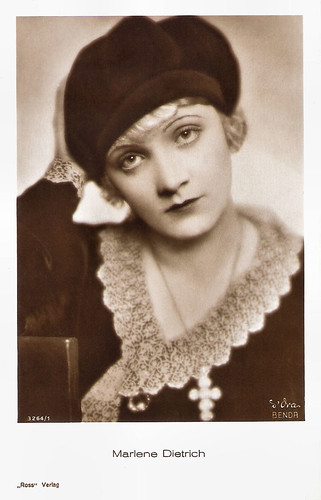
German postcard by Ross Verlag, no. 3264/1, 1928-1929. Photo: D'Ora (Dora Kallmus), Arthur Benda.
Image may be NSFW.
Clik here to view.

French postcard by Europe, no. 647. Photo: Mercure Film. Marlene Dietrich in Die Frau, nach der man sich sehnt/The Woman One Longs For (Kurt Bernhardt, 1929).
Image may be NSFW.
Clik here to view.

Austrian postcard by Iris Verlag, no. 5076. Photo: Sascha Film. Marlene Dietrich in Café Elektric/Cafe Electric (Gustav Ucicky, 1927). Collection: Marlene Pilaete.
Image may be NSFW.
Clik here to view.
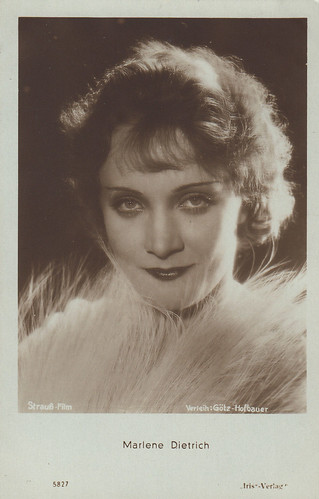
Austrian postcard by Iris-Verlag, no. 5827. Photo: Strauss-Film. Marlene Dietrich in Gefahren der Brautzeit/Nights of Love (Fred Sauer, 1929). Collection: Marlene Pilaete.
Image may be NSFW.
Clik here to view.
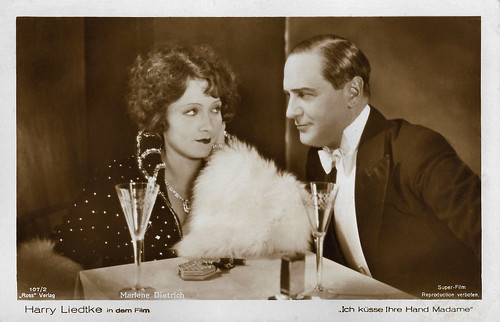
German postcard by Ross Verlag, Berlin, no. 107/2. Photo: Super-Film. Harry Liedtke and Marlene Dietrich in Ich küsse Ihre Hand Madame/I Kiss Your Hand Madame (Robert Land, 1929).
Image may be NSFW.
Clik here to view.
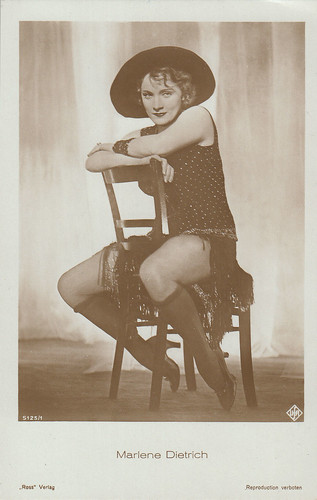
German postcard by Ross Verlag, no. 5125/1, 1930-1931. Photo: Ufa. Marlene Dietrich in Der blaue Engel/The Blue Angel (Josef von Sternberg, 1930). Collection: Marlene Pilaete.
Image may be NSFW.
Clik here to view.
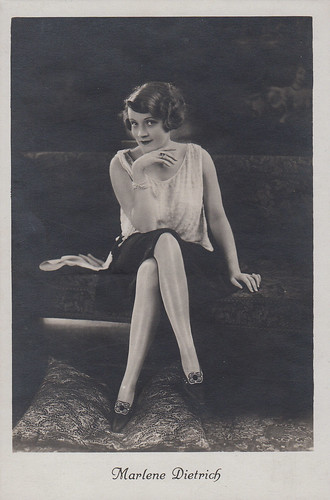
German postcard by H.C. Stöckel, Hannover-Linden for Bemberg socks. Caption: "I only wear Bemberg socks. Marlene Dietrich". Collection: Marlene Pilaete.
Image may be NSFW.
Clik here to view.
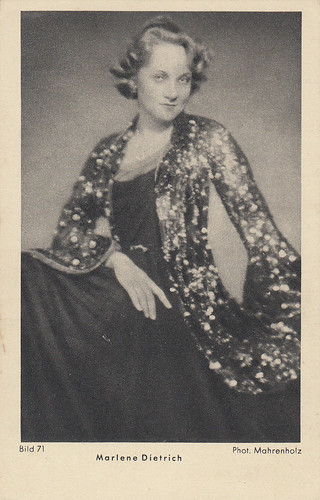
German postcard by Eidelsan, serie 1 , Bild 71. Photo: Mahrenholz. Collection: Marlene Pilaete.
Image may be NSFW.
Clik here to view.

British postcard in the Famous Cinema Star Series by Beagles Postcards, no. 79 N. Collection: Marlène Pilaete.
Image may be NSFW.
Clik here to view.

Dutch postcard by JSA, no. 230. Photo: Frhr. W. von Gudenberg. Collection: Marlene Pilaete.
The woman one longs for
Throughout her long career, Marlene Dietrich constantly re-invented herself. In 1921, she auditioned unsuccessfully for Max Reinhardt's drama academy, but she soon found herself working in his theatres as a chorus girl and playing small roles in dramas.
The next year she played a part in the silent film So sind die Männer/The Little Napoleon (Georg Jacoby, 1922). On the set of another film, Tragödie der Liebe/The Tragedy of Love (Joe May, 1923), she met production assistant Rudolf Sieber. They were married in 1923. Her only child, daughter Maria Elisabeth Sieber, later billed as actress Maria Riva, was born in 1924.
Throughout the 1920s Marlene continued to work on stage and in films both in Berlin and Vienna. She attracted the most attention in stage musicals and revues, such as 'Broadway' and 'Es Liegt in der Luft' (It's in the Air).
By the late 1920s, she was also playing leading parts in such films as Café Elektric/Cafe Electric (Gustav Ucicky, 1927) with Willi Forst, Ich küsse Ihre Hand, Madame/I Kiss Your Hand Madame (Robert Land, 1929) with Harry Liedtke, and Die Frau, nach der man sich sehnt/The Woman One Longs For (Kurt/Curtis Bernhardt, 1929) opposite Fritz Kortner.
In 1929 Marlene Dietrich played her breakthrough role of Lola-Lola, a cabaret singer who causes the downfall of Immanuel Rath (Emil Jannings), a hitherto respected schoolmaster, in the Ufa production Der blaue Engel/The Blue Angel (Josef von Sternberg, 1930), of which separate German and English versions were shot simultaneously.
Josef von Sternberg thereafter took credit for having ‘discovered’ her. The film is also noteworthy for introducing her signature song 'Falling in Love Again'. On the strength of Der blaue Engel's success, and with encouragement and promotion from Von Sternberg, Dietrich then moved to Hollywood.
Image may be NSFW.
Clik here to view.

German collectors card by Ross Verlag in the series 'Vom Werden deutscher Filmkunst - Der Tonfilm', album no. 11, picture no. 9, group 45. Photo: Ufa. Marlene Dietrich and Rosa Valetti (middle) in Der blaue Engel/The Blue Angel (Josef von Sternberg, 1930). Caption: Marlene Dietrich as classy chansonette Lola in the 'Blue Angel'.
Image may be NSFW.
Clik here to view.

German collectors card. Photo: Super film. Hans Albers and Marlene Dietrich in Der blaue Engel/The Blue Angel (Josef von Sternberg, 1930).
Image may be NSFW.
Clik here to view.
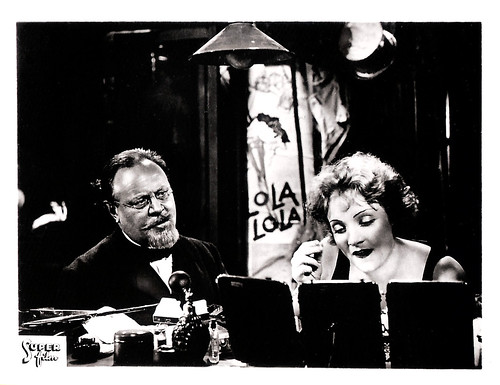
German collectors card. Photo: Super film. Emil Jannings and Marlene Dietrich in Der blaue Engel/The Blue Angel (Josef von Sternberg, 1930).
Image may be NSFW.
Clik here to view.

German collectors card. Photo: Super film. Emil Jannings and Marlene Dietrich in Der blaue Engel/The Blue Angel (Josef von Sternberg, 1930).
Image may be NSFW.
Clik here to view.
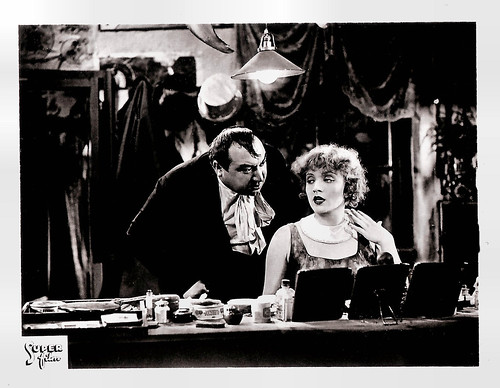
German collectors card. Photo: Super film. Kurt Gerron and Marlene Dietrich in Der blaue Engel/The Blue Angel (Josef von Sternberg, 1930).
Image may be NSFW.
Clik here to view.

German collectors card. Photo: Super film. Publicity still for Der blaue Engel/The Blue Angel (Josef von Sternberg, 1930).
Image may be NSFW.
Clik here to view.
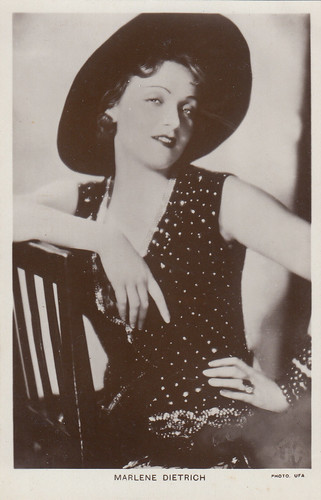
British postcard in the Picturegoer series. Photo: Ufa. Marlene Dietrich in Der blaue Engel/The Blue Angel (Josef von Sternberg, 1930). Collection: Marlene Pilaete.
Sources: Wikipedia and IMDb.